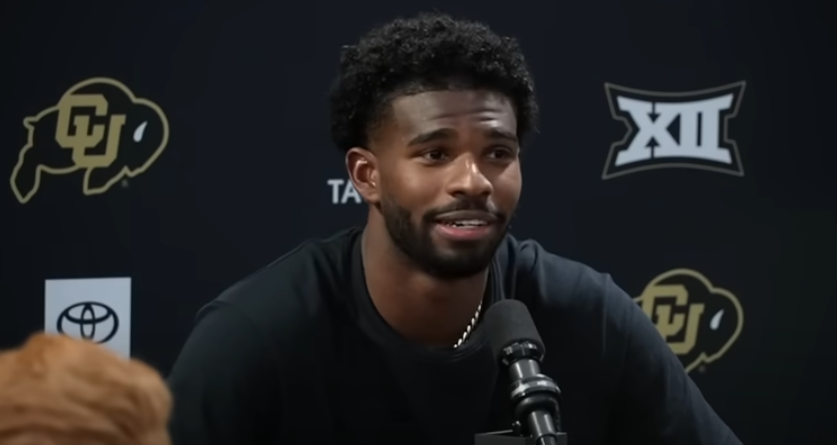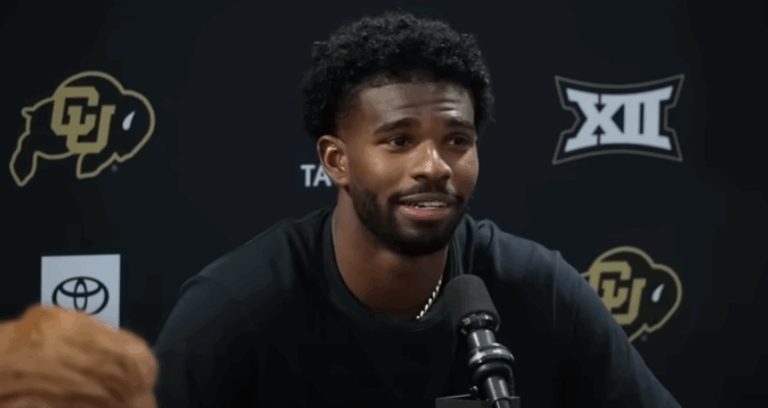The NFL Hall of Famer Deion Sanders’ son, Shedeur Sanders, has already garnered a lot of interest as a bright young football player. Shedeur’s path to the NFL was highly anticipated after he excelled as a college quarterback at Jackson State and the University of Colorado. Shedeur appeared destined for a first-round pick in the 2025 NFL Draft thanks to his impressive performances and the mentoring of his illustrious father. But his path took an unexpected turn, bringing to light the changing nature of collegiate athletics as well as the unpredictable nature of sports.
Shedeur, who was born on February 7, 2002, was naturally surrounded by football because of his father’s fame. Shedeur had a front-row seat to NFL greatness, growing up in a home where the game was more than just a passion. After a string of outstanding accomplishments during his time at Trinity Christian School in Cedar Hill, Texas, he was named a four-star recruit. His real potential, however, started to emerge on the national scene when he made the decision to follow his father to Jackson State University. He immediately became well-known there, taking home the Jerry Rice Award for being the best freshman in the Football Championship Subdivision (FCS).
Although team performance at Colorado was less reliable, Shedeur’s move to the University of Colorado, where he was coached by his father, increased his profile. Shedeur did, however, exhibit the poise and accuracy that caught scouts’ attention. He was an exceptional performer statistically, able to control pressure and make accurate throws. Scouts started to express concerns about his propensity to hold onto the ball for too long and his difficulties with in-game pressure, despite his promising skill set. These worries would follow him into the draft, where his unquestionable talent and family history were expected to propel him to selection in the first round.
| Bio Data | Details |
|---|
| Full Name | Shedeur Sanders |
| Date of Birth | February 7, 2002 |
| Place of Birth | Cedar Hill, Texas |
| College | Jackson State, University of Colorado |
| Position | Quarterback |
| NFL Draft | Selected by Cleveland Browns, 5th Round, 144th Overall, 2025 |
| Net Worth | $4 Million (as of 2025) |
| NIL Earnings | Over $5 million during college career |
| Notable Brands | Gatorade, Beats by Dre, Mercedes-Benz |
Many people considered Shedeur Sanders to be among the best quarterbacks available in the months preceding the 2025 NFL Draft. Deion Sanders, his father, was outspoken in his belief that Shedeur would be chosen in the top five picks, an optimistic forecast that attracted a lot of attention. Regretfully, Shedeur’s stock started to decline as the draft process progressed. In addition to his poor interview performances, questions were raised about his leadership and mechanics on the field. The Cleveland Browns selected him in the fifth round, 144th overall, as a result of these factors.
The financial ramifications of this unforeseen draft position were substantial. Shedeur’s rookie contract might have been worth up to $8.4 million for the first year alone if he had been chosen in the first few spots as was originally anticipated. He chose to sign a much smaller contract instead, one that was worth $4.64 million over four years and included a signing bonus of only $447,380. Over the course of the contract, the earnings disparity is remarkably substantial, representing a loss of almost $42 million. The harsh realities of professional sports, where expectations and forecasts do not always match results, are brought home by this financial decline.

Name, Image, and Likeness (NIL) deals, which have grown more profitable for elite collegiate athletes, have allowed Shedeur to profit from his notoriety in spite of these obstacles. He signed endorsement contracts with well-known companies like Gatorade, Beats by Dre, and Mercedes-Benz while he was at Colorado, making him one of the highest-paid collegiate athletes. Even though his team’s performance varied, he was one of the most marketable college football players thanks to his earnings, which came to over $5 million. These agreements demonstrate how athletes can use their personal brand to make a sizable income while still enrolled in school, which is a new reality for many collegiate athletes.
While many of his college peers, including quarterbacks, continued to earn millions of dollars by choosing to stay in school, Shedeur’s decision to enter the NFL Draft early cost him even more opportunities. The financial landscape of collegiate athletics has changed due to the quick growth of NIL deals, and players are now more frequently forced to decide between making money during their time in college and going pro. Shedeur’s situation offers insight into this conundrum, where the pressure to become a professional can result in lost revenue.
Shedeur continues to be a highly sought-after figure on and off the field in spite of the financial setbacks. Because of his well-known name and devoted fan base, which are reinforced by his father’s legacy, he remains a highly marketable athlete. His financial future may significantly improve if he can adapt to the demands of the NFL. Shedeur’s story also provides a compelling illustration of how skill, business, and the changing regulations of contemporary sports interact.
Shedeur’s rookie contract is modest when compared to NFL salary structures. His potential as a quarterback is still high, even though his first contract might not be as large as those of top draft picks. Shedeur’s success on the field will be crucial to securing bigger contracts and more endorsement opportunities, as many NFL veteran quarterbacks make much more money. He might eventually land the kind of multi-million dollar contracts that his father once had during his NFL career if he can demonstrate his abilities on the field.
Shedeur’s narrative also sheds light on the larger pattern of collegiate athletes negotiating a more competitive and commercialized environment. The way that financial opportunities in college sports are viewed has changed as a result of NIL deals that enable athletes to make money off of their name, image, and likeness. There are benefits and risks for athletes like Shedeur. Financial setbacks accompanied his early NFL move, but it also signaled the start of a new chapter in his career, one that could still pay off handsomely as he develops as a professional quarterback.



